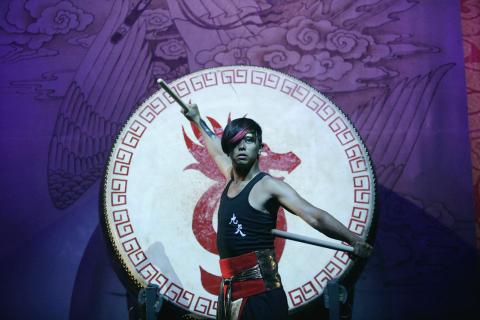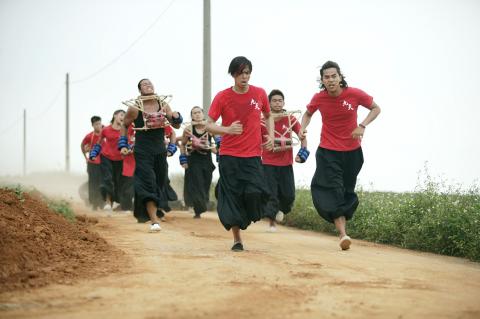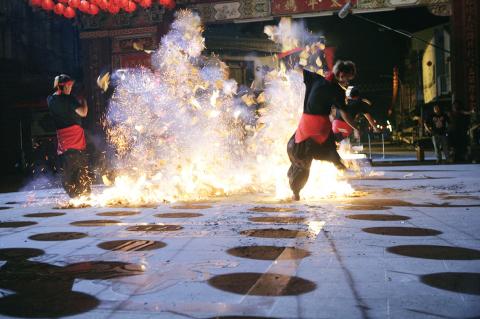Seasoned television director Fung Kai’s (馮凱) Din Tao: Leader of the Parade (陣頭) is edifying for those not familiar with dintao, a type of traditional temple performance troupe. For everyone else, the film is an overly long formulaic exercise in banality.
Performer Allen Ko (柯有倫) plays A-tai, a young man who dreams about becoming a rocker in the US. He quits school in Taipei and returns to his Taichung hometown before following his heart’s desire.
A-tai has never been on good terms with his father, Uncle Da (Chen Po-cheng, better know as A-hsi, 阿西), who runs a dintao troupe. The father and son never make an effort to understand one another, and quarrel each time they meet.

Photo Courtesy of IFILM
But Uncle Da has other things to worry about. While his company struggles to make ends meet, long-standing rival Wu Cheng (Liao Chun, 廖峻) and his troupe meet with success and popularity.
Irked by Wu’s arrogance, A-tai decides to take the troupe’s demoralized members on a countrywide walk in search of inspiration to revamp the traditional folk art form.
The movie was inspired by the Jyou-Tian Folk Drum and Arts Group (九天民俗技藝團). Founded in 1995 by drummer Shue Chen-rong (許振榮), the Taichung-based troupe is credited with updating folk drumming, acrobatics and traditional dances for contemporary audiences and introducing the performances to international audiences by attending art festivals abroad. The troupe’s last sojourn was a seven-day, 250km-long ultra marathon across the Sahara Desert in Egypt in October, completed while its members carried a 17kg statue of the deity Nezha (哪吒).

Photo Courtesy of IFILM
The movie has a certain degree of authenticity in its depiction of dintao as an extended family in which the troupe’s leader is more like a father figure to the group’s young members, most of whom are dropouts. It also fares well in the acting department, anchored by veteran actors A-hsi, Liao Chun and Samantha Ko (柯淑勤). Pop idol Alien Huang, better known as Hsiao-kuei (小鬼), deserves special mention for his dintao performances. Yet the movie is little more than a glorified television drama, replete with cliches, stereotypical characters and an uneven narrative.
As Taiwanese grassroots culture is a mainstay of local productions of late, movies like Din Tao: Leader of the Parade have come one after another, following what is believed to be a winning formula that blends traditional practices with modern elements. However, without a good story line and emotional depth to sustain it, the enthusiasm for traditional cultural doesn’t last the distance.

Photo Courtesy of IFILM

Taiwan has next to no political engagement in Myanmar, either with the ruling military junta nor the dozens of armed groups who’ve in the last five years taken over around two-thirds of the nation’s territory in a sprawling, patchwork civil war. But early last month, the leader of one relatively minor Burmese revolutionary faction, General Nerdah Bomya, who is also an alleged war criminal, made a low key visit to Taipei, where he met with a member of President William Lai’s (賴清德) staff, a retired Taiwanese military official and several academics. “I feel like Taiwan is a good example of

March 2 to March 8 Gunfire rang out along the shore of the frontline island of Lieyu (烈嶼) on a foggy afternoon on March 7, 1987. By the time it was over, about 20 unarmed Vietnamese refugees — men, women, elderly and children — were dead. They were hastily buried, followed by decades of silence. Months later, opposition politicians and journalists tried to uncover what had happened, but conflicting accounts only deepened the confusion. One version suggested that government troops had mistakenly killed their own operatives attempting to return home from Vietnam. The military maintained that the

Jacques Poissant’s suffering stopped the day he asked his daughter if it would be “cowardly to ask to be helped to die.” The retired Canadian insurance adviser was 93, and “was wasting away” after a long battle with prostate cancer. “He no longer had any zest for life,” Josee Poissant said. Last year her mother made the same choice at 96 when she realized she would not be getting out of hospital. She died surrounded by her children and their partners listening to the music she loved. “She was at peace. She sang until she went to sleep.” Josee Poissant remembers it as a beautiful

Before the last section of the round-the-island railway was electrified, one old blue train still chugged back and forth between Pingtung County’s Fangliao (枋寮) and Taitung (台東) stations once a day. It was so slow, was so hot (it had no air conditioning) and covered such a short distance, that the low fare still failed to attract many riders. This relic of the past was finally retired when the South Link Line was fully electrified on Dec. 23, 2020. A wave of nostalgia surrounded the termination of the Ordinary Train service, as these train carriages had been in use for decades